
Royal Grammar School, High Wycombe - 1963/64, Form 2E


Back row (left to right): RC (Richard) Cobb, PNE (Pat) Collins, DJ (David) Hall, AR (Andrew) Jackson, DJ (David) Moore, BD (Barney) Payne, CL (Clive) Simmons, JC (John) Saunders, RB (Richard) Hipgrave
3rd row: DJ (David) Morris, R (Roger) Davison, SC (Simon, more often known as Chris) Lambert, CDJ (Chris) Edwards, JC (John) Dixon, RA (Roger) Moore, CD (Chris) Hardy
2nd row: JR (James) Trayhorn, SVT (Stephen) Arnold, IM (Ian) Orme, C (Colin) Grafton, CP (Chris) Menmuir, CM (Mick) Rose
Front row (left to right): JW (Jonathan) Everett, CJ (Chris) Marshall, JR (Jerry) Darvill, SR (Stuart) Weyer, AN (Adrian) Lee.
A colourised version of the photo may be viewed at the RGS High Wycombe Flickr collection.
MY TIME IN 2E (1963/64)
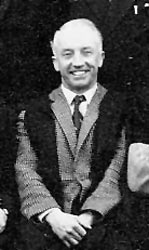 I have no need to ask anyone the surnames of people in the above photo as they remain firmly imprinted on my memory. The forenames are a bit hazy in some cases, so I would appreciate some help with those (and my thanks to Richard Hipgrave who has contributed in this direction). This is form 2E, the youngest class in the school in the academic year 1963/64. Our form-master was (of course) Mr M M (Mervyn, "Taffy") Davies, who always presided over the youngest class in the school. Most of us arrived at the school aged only ten, with the youngest of all, Andrew Jackson, not turning 11 until April 1964. In Bucks in those days you were allowed to sit the 11-plus examination a year earlier, and Form 2E was mainly composed of boys who had successfully crossed that hurdle.
I have no need to ask anyone the surnames of people in the above photo as they remain firmly imprinted on my memory. The forenames are a bit hazy in some cases, so I would appreciate some help with those (and my thanks to Richard Hipgrave who has contributed in this direction). This is form 2E, the youngest class in the school in the academic year 1963/64. Our form-master was (of course) Mr M M (Mervyn, "Taffy") Davies, who always presided over the youngest class in the school. Most of us arrived at the school aged only ten, with the youngest of all, Andrew Jackson, not turning 11 until April 1964. In Bucks in those days you were allowed to sit the 11-plus examination a year earlier, and Form 2E was mainly composed of boys who had successfully crossed that hurdle.
The 1963 Grey Book lists two other members of form 2E who do not appear in the photo. PA (Phil) Davis was in the class for a term or two, appearing in the Gilbert & Sullivan production of 'Ruddigore' along the way, but at some point during the school year he left. The other boy missing from the photo is SD (Stuart) McLean. He had been a School House boarder and actually started at the school during the previous summer term. But I believe he became very homesick (I think his parents were in the USA) and abruptly left the school (evidently some time before this photo was taken).
THE NEW BUILDINGS
We were the first new intake to move into the brand-new buildings at the front of the school (and so never suffered the 'Stalag Luft' privations of the Uplyme 'Terrapin' huts, told to us in gory detail by 'three-bugs' and older brothers).
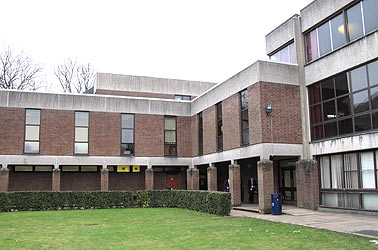
The RGS 'new' buildings, first occupied in 1963, as they appear in 2009
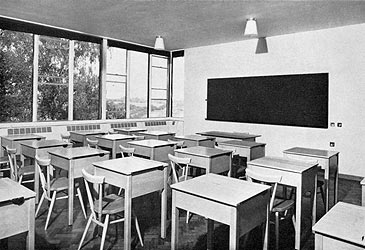
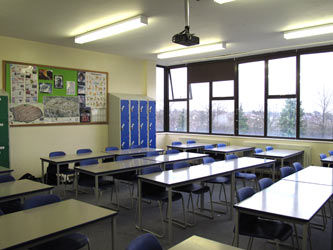
(Left) One of the classrooms in the 'new block' in 1963 and (right) the old 2E form room as it appears in 2009
Brand new desks and freshly plastered walls were the order of the day. The slight downside to this was that every mark on walls and furniture would be instantly noticeable. We were soon warned of the dire consequences should anybody be tempted to leave his initials behind for posterity. The vandals amongst us simply had to wait two years for the time when we were moved into some hideous classroom in the prison-like 'Gym Block' corridor, with its doleful photos of Scott's doomed Antarctic expedition, and where acts of vandalism were less likely to be traced to the perpetrator.
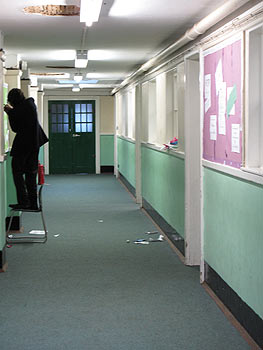
The Gym Block corridor in 2009: almost as dismal as in 1965! Not sure what the lad on the left is doing but I presume it was legitimate...
As with all new buildings, there were teething troubles, and maintenance people occasionally interrupted lessons as they tried to fix non-functioning venetian blinds and central heating. But just having such things as central heating was quite new and exciting to those of us used only to 1960s council houses (with no upstairs heating) and chilly Victorian primary schools. As the man in the Monty Python sketch might have said: "Central heating? Luxury!". As well as an education, the RGS gave me my first experience of all-day warmth (well, except on games and gym days, of course).
I've been told that the pre-new building Form 2E did not occupy anything quite so luxurious as a 'Terrapin' hut at Uplyme (which did at least have some rudimentary heating) but a shed - which, amazingly, is still standing. You can see the the site of Uplyme via Google's satellite map and I'm reliably informed that the longish shed you can see in the middle was 2E's classroom until the summer of 1963. I wonder what the shed is used for today.
Form 2E's Teachers
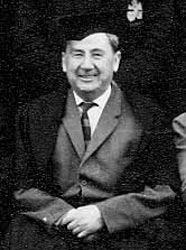 Back in 1963/64, our teachers were as follows. Taffy Davies (pictured above) took us for French and Divinity (I think we called it that, rather than Religious Instruction or Religious Knowledge) - he was a very affable and easy-going man and classes with him were always a pleasant experience. Edmund Ronald 'Boss' Tucker (pictured left) took us for Latin - being a very busy man, I don't think he taught any other classes at the school but liked to keep his hand in by teaching the youngest boys. Even so, he missed a lot of lessons and I recall that he only took in our homework a couple of times in the first term - on the last occasion we didn't get our exercise books back for many months. His authority was absolute, of course, and I don't remember any small boy even thinking about taking a step out of line with him. I vaguely recall him getting cross with somebody once and threatening corporal punishment but, as we chessplayers like to say, "the threat was mightier than the execution". In fact he seemed generally good humoured and not at all intimidating (older boys, or those of an earlier era, have often told a very different story - I can only recount my own experience).
Back in 1963/64, our teachers were as follows. Taffy Davies (pictured above) took us for French and Divinity (I think we called it that, rather than Religious Instruction or Religious Knowledge) - he was a very affable and easy-going man and classes with him were always a pleasant experience. Edmund Ronald 'Boss' Tucker (pictured left) took us for Latin - being a very busy man, I don't think he taught any other classes at the school but liked to keep his hand in by teaching the youngest boys. Even so, he missed a lot of lessons and I recall that he only took in our homework a couple of times in the first term - on the last occasion we didn't get our exercise books back for many months. His authority was absolute, of course, and I don't remember any small boy even thinking about taking a step out of line with him. I vaguely recall him getting cross with somebody once and threatening corporal punishment but, as we chessplayers like to say, "the threat was mightier than the execution". In fact he seemed generally good humoured and not at all intimidating (older boys, or those of an earlier era, have often told a very different story - I can only recount my own experience).
Incidentally, I've written a bit more about some of the masters elsewhere on the website, where I have posted a scan of my school report for the summer term of 1964. Might be worth reading in conjunction with this page.
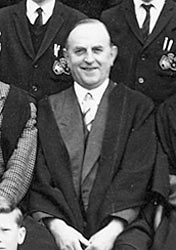
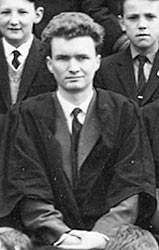 A much scarier teacher to us was 'Holly' Hollingworth (pictured left) who took us for English. If you did or said anything vaguely stupid, he would fix you with his beady eye and subject you to a searching interrogation. He was also the head of the junior school and if your answers to the interrogation failed to satisfy him, there was the possibility of being taken back to his study for a caning. This happened to several of our number but thankfully not to me. After a few weeks, we had some of our English lessons taken over by a new teacher, Mr Cockle (pictured right), which meant that our lessons with Holly were reduced by half - a massive relief for all of us. I remember learning to analyse a sentence with Holly - it involved drawing abstruse diagrams in your exercise book - more like maths than English - and having nouns, verbs, adverbs, etc, drummed into you. It also involved a lot of memorisation of definitions and woe betide you if you weren't word perfect when challenged. Mr Cockle I think took us for English Literature. He was young and shy and easy-going - and I can't remember a single thing that he taught us.
A much scarier teacher to us was 'Holly' Hollingworth (pictured left) who took us for English. If you did or said anything vaguely stupid, he would fix you with his beady eye and subject you to a searching interrogation. He was also the head of the junior school and if your answers to the interrogation failed to satisfy him, there was the possibility of being taken back to his study for a caning. This happened to several of our number but thankfully not to me. After a few weeks, we had some of our English lessons taken over by a new teacher, Mr Cockle (pictured right), which meant that our lessons with Holly were reduced by half - a massive relief for all of us. I remember learning to analyse a sentence with Holly - it involved drawing abstruse diagrams in your exercise book - more like maths than English - and having nouns, verbs, adverbs, etc, drummed into you. It also involved a lot of memorisation of definitions and woe betide you if you weren't word perfect when challenged. Mr Cockle I think took us for English Literature. He was young and shy and easy-going - and I can't remember a single thing that he taught us.
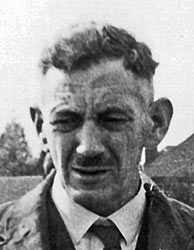
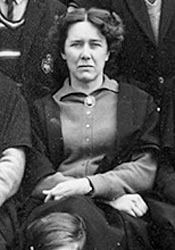 'Tus' Sheppard (pictured left) took us for Geography. His nickname and the number 'one-four-nine' which was associated with him were a constant source of merriment to all RGS boys for many years, and have been described by Andrew MacTavish at the official old boys site. As for the man himself, he seemed ancient and rather woebegone in an emotionless sort of way. I got the impression that long years of teaching small boys had utterly sapped his spirit. I always felt rather sorry for him. His full name was Thomas Vincent Sheppard (1908-86). For maths, we had Mrs Winifred Wood (pictured right) and Mr Duffield (pictured, below right). Mrs Wood had three sons at the school who were all very successful academically and I remember her being very competent and serious-minded as a teacher. Sadly, news came through in the December 2009 Newsletter that Mrs Wood died in October 2009, aged 88.
'Tus' Sheppard (pictured left) took us for Geography. His nickname and the number 'one-four-nine' which was associated with him were a constant source of merriment to all RGS boys for many years, and have been described by Andrew MacTavish at the official old boys site. As for the man himself, he seemed ancient and rather woebegone in an emotionless sort of way. I got the impression that long years of teaching small boys had utterly sapped his spirit. I always felt rather sorry for him. His full name was Thomas Vincent Sheppard (1908-86). For maths, we had Mrs Winifred Wood (pictured right) and Mr Duffield (pictured, below right). Mrs Wood had three sons at the school who were all very successful academically and I remember her being very competent and serious-minded as a teacher. Sadly, news came through in the December 2009 Newsletter that Mrs Wood died in October 2009, aged 88.
Mr Richard Duffield was a new teacher and I remember his kindness when I told him I hadn't done decimals at my (not very good) primary school. 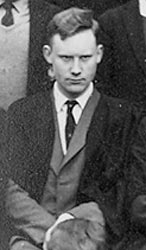 He told me not to worry about it, set the rest of the class some work to get on with, and explained the mysteries of decimal arithmetic to me on my own for a lesson or two. After that, I rejoined the whole class and we all started on binary numbers. Very useful many years later when I worked for a while as a computer programmer. It was also the only aspect of first-year maths that was new to my mother when I took my homework home. She insisted on me explaining it all to her so that she could follow the course (she always tried to do that with my school subjects, except when I started doing Greek).
He told me not to worry about it, set the rest of the class some work to get on with, and explained the mysteries of decimal arithmetic to me on my own for a lesson or two. After that, I rejoined the whole class and we all started on binary numbers. Very useful many years later when I worked for a while as a computer programmer. It was also the only aspect of first-year maths that was new to my mother when I took my homework home. She insisted on me explaining it all to her so that she could follow the course (she always tried to do that with my school subjects, except when I started doing Greek).
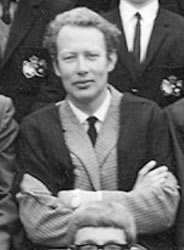 For history, we had 'Bilge' Leighton-Jones (pictured left). The only thing I recall about him was that he couldn't pronounce his 'r's and had a catchphrase of "Well, WEALLY, you know!" when he became exasperated with us (although he was generally quite relaxed). He left at Xmas and was replaced by a Mr Masters, though he returned to the school some time later.
For history, we had 'Bilge' Leighton-Jones (pictured left). The only thing I recall about him was that he couldn't pronounce his 'r's and had a catchphrase of "Well, WEALLY, you know!" when he became exasperated with us (although he was generally quite relaxed). He left at Xmas and was replaced by a Mr Masters, though he returned to the school some time later.
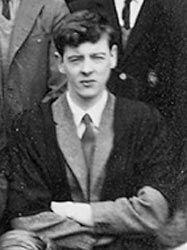 For Science we had to troop off to the Science Block and have lessons with Mr J Gareth Rowland (pictured right). I always hated the chemical smell of the laboratories and tended to day-dream through science lessons so didn't learn much.
For Science we had to troop off to the Science Block and have lessons with Mr J Gareth Rowland (pictured right). I always hated the chemical smell of the laboratories and tended to day-dream through science lessons so didn't learn much.
Occasionally we had a stand-in teacher. One of these was the famous 'Piljy' Jones (pictured below left) who had been teaching at the school since the First World War (with a short break, I think, while he himself went off to fight the Hun). My brother had told me all about his (what shall we call them?) funny little ways, such as 'elastication' (creeping up and pinging you behind the ear with an elastic band) and 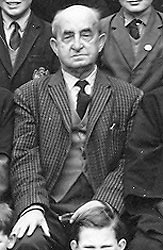 delegating the slippering of boys to other boys in the class (because he had become far too decrepit to do it himself), but I don't recall him visiting any of these tortures on us - except for the traditional withering sarcasm beloved of rather too many RGS masters of that era. His full name and dates were Peter Lewis Jones (1892-1970).
delegating the slippering of boys to other boys in the class (because he had become far too decrepit to do it himself), but I don't recall him visiting any of these tortures on us - except for the traditional withering sarcasm beloved of rather too many RGS masters of that era. His full name and dates were Peter Lewis Jones (1892-1970).
MUSIC AND ART
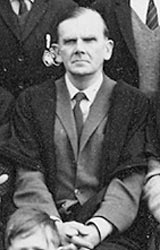
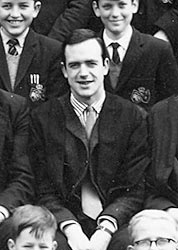 In my first draft of this article, I completely forgot to mention Music and Art, both of which featured on the timetable. We were taught Music by head of department 'Jack' Dawes (pictured left). The first thing he did was test us all individually for the school choir. I passed, which meant taking part in various concerts. He was a lively teacher who got us singing various folk songs, etc, in the new Music Department which formed part of the new buildings. For Art we had Tim Newling (pictured right), who was young and trendy - one of the few teachers who looked like he belonged to the 1960s. I can't remember too much about his classes except that he was very laid-back and relaxed.
In my first draft of this article, I completely forgot to mention Music and Art, both of which featured on the timetable. We were taught Music by head of department 'Jack' Dawes (pictured left). The first thing he did was test us all individually for the school choir. I passed, which meant taking part in various concerts. He was a lively teacher who got us singing various folk songs, etc, in the new Music Department which formed part of the new buildings. For Art we had Tim Newling (pictured right), who was young and trendy - one of the few teachers who looked like he belonged to the 1960s. I can't remember too much about his classes except that he was very laid-back and relaxed.
GAMES
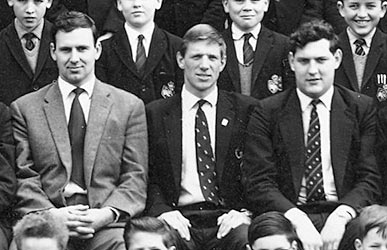
"Ouch! Yarroo! You rotters!"
Games masters Rex Jones (left), John Williams (middle), Brian Poll (right)
Sadly, the laws of the land demanded that a boy's 'mens sana' should reside in a 'corpore sano' and to that end, several times a week, we were subjected to the tender mercies of games masters. A couple of periods of Gym and a double period of Rugby/Cross Country (or Cricket in the summer term) appeared in the timetable. For Gym we had Rex Jones. He also figured in rugby and cross country where various other people such as John Williams and Freddie Hawkins were in charge. Suffice to say that I hated gym and rugby, also boxing (which we had to do a few times), had a bit more time for cross country and quite enjoyed cricket. During the lunch hour we tended to play soccer and I resented the fact that we couldn't play it formally because of the RGS and its stupid 'rugby-only' rule. (Having said which, I was utterly useless at football as well.) I think Brian Poll was also a games master as well as teaching Geography - he was a bit more easy-going than his Cymric colleagues. Later still in my time at the RGS, Jock Learmonth was in charge of games and provided a welcome breath of Scottish air after a good deal of what went before.
LUNCH WITH MR HETT
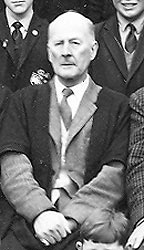 There was one other area (besides lessons and sports) where one found oneself under the beady eye of a master. That was in the school canteen at lunchtime. You had to sit in exactly the same place on the same table for every day of the school year. And the master at the head of the table was always the same one. This was an absolute disaster for my ten-year-old self as I had to sit next to Mr A S ("Crappy") Hett (pictured left) every single day of the school year. I will leave those of you who enjoy word games to work out how he came by that unfortunate nickname but, rightly or wrongly, I suspect I am not the only one who thought he deserved it for an entirely different reason.
There was one other area (besides lessons and sports) where one found oneself under the beady eye of a master. That was in the school canteen at lunchtime. You had to sit in exactly the same place on the same table for every day of the school year. And the master at the head of the table was always the same one. This was an absolute disaster for my ten-year-old self as I had to sit next to Mr A S ("Crappy") Hett (pictured left) every single day of the school year. I will leave those of you who enjoy word games to work out how he came by that unfortunate nickname but, rightly or wrongly, I suspect I am not the only one who thought he deserved it for an entirely different reason.
I have already mentioned the RGS schoolmaster's propensity for sarcasm and Mr Hett was probably the ultimate practitioner of this unlovely branch of humour. His favourite catchphrase was "Aren't I allowed any potatoes?", delivered in his cut-glass, pre-WW1 Oxford accent (the nearest we have to him today is the art critic Brian Sewell, who can also do the swallowed-a-lemon pinched face of Mr Hett). This and other cutting comments would greet our lamentable failure to give him first use of the various food dishes which we brought to the table. Every day we seemed to be lectured on our deplorable manners and lack of courtesy. Occasionally I would dare to cast an envious glance over my shoulder and see other boys chatting and laughing at their more relaxed tables and wish I could escape the prim and proper Hett table. He could be a terrible snob - my brother recalls him referring to ill-mannered boys as "slumkins".
But, looking back, Mr Hett is in some ways the master of that era who fascinates me the most. In retrospect it was like coming into contact with a schoolmaster who had been transplanted from Victorian times into the mid-twentieth century. Unpleasant though the daily interrogations and castigations were, I am now quite glad that I had those daily sessions with him - even if only to tell this tale. In some ways I suppose he was just a man of his times. The school history tells us the following about him - "M.A. (Oxon). [Started at the RGS in] 1943. Hockey blue. Modern Languages. Served as a pilot with the Royal Flying Corps in first world war. Absent, teaching at Trinity College School, Port Hope, Ontario during 1947/48." He left at the end of the 1963/64 school year and the Wycombiensian marked the end of his 20-year stint as follows: "Mr A. S. Heatt [sic] retired after 21 years." Although best wishes were added further down the paragraph, they were directed equally to ten other staff leavers of lesser seniority. By contrast, the legendary PLJ received a full page valediction (admittedly after a stint that was more than twice as long). Perhaps I'm reading too much into it but this seemed to hint at a lack of warmth amongst his colleagues. True, he was mentioned again in the report of the headmaster's speech on Speech Day, but they managed to misspell his name as 'Heatt' again. I also submit as evidence the apocryphal but much-told story about Mr Hett sending a boy to Sam Morgan for a flogging for some minor offence. The dialogue is alleged to have gone as follows - Sam: "Who sent you?" Boy: "Mr Hett, sir". Sam (impatiently): "Oh - go back rubbing your arse!".
'MILDLY TEACHING'
At the back of the same issue of the Wycombiensian is a final comment on Mr Hett (this time they spell his name correctly): "... after twenty years, Mr Hett has now retired. He hopes to carry on 'mildly teaching' in Canada or Europe. He will keep the Hon. Secretary [MM Davies who would have written this] informed of his address so that Old Boys can visit him whenever they pass nearby. He will be very glad to see them." That's it - no "best wishes" (as MMD wished PLJ in the preceding para; in respect of the retiring PL Jones he also mentioned the ''love and affection and admiration of countless Old Boys' - rather a stark contrast again). 'Mildly teaching'? I should have hated to have been taught by him when he was 'full-on'...
A little while later (May 1965) found him teaching in a prep school in Oxford. News followed of Mr Hett's death in 1967 - here is the obituary from the May 1968 issue of the Wycombiensian:
"A. S. HETT (1943-63). On October 26th, 1967 at the Westminster Hospital, aged 69 years. Mr. Alan Stanley Hett, M.A., was educated at Uppingham, Oxford and Poitiers. Before coming to the Royal Grammar School in 1943, Mr. Hett had taught all over the world. He started his teaching career in Paris, returned to Uppingham, went out to Hongkong, came back to Dulwich College, went out to India to teach in Lahore, returned to Bedford School and then Stowe School before coming to High Wycombe. In the 1914-18 War he joined the Flying Corps while still at School and was lucky to survive a bad crash while still training. He was a first-class player of all ball games and gained a blue for hockey at Oxford. The boys whom Mr. Hett taught will probably remember him for the petrified awe he inspired in them. He did not need to be in a class to have complete and absolute control of it - he needed only to be on the way to take it. Yet he could be the kindest and most generous of men and it was well known that he corresponded with numerous Old Boys all over the world giving them every help and encouragement."
Postscript: it is possible that the Wycombiensian may once again have erred as regards the spelling of Mr Hett's name, this time with regard to his forename (but see further down). I checked the online births, marriages and deaths register and discovered that his name at birth was Allan Stanley Hett and that he had been born in the 1st quarter of 1898 - the birth was registered in the Glanford Brigg district of Lincolnshire. Incidentally, after some more googling, I discovered that 2nd Lt. A.S. Hett, S.R. , had been confirmed in his rank and as a Flying Officer in the RFC on 20 February 1917 (this must have been around his 19th birthday). I think "S.R." stands for "Special Reserve". He was once again listed as a Flying Officer in the London Gazette in 1939. They spelt his first name as 'Alan' so it is possible that the Wycombiensian spelling was not wrong and that he himself varied the spelling of his birth name. Some years later, when I saw the Simon Gray play Quartermaine's Terms, I found that its main character (memorably played by Edward Fox in the TV production) reminded me somewhat of Mr Hett.
What else can I remember? I recall that Ian Orme organised a class chess tournament. I wasn't a member of the school club but had learnt the rules from my brother at home when I was about 7 or 8. I got through to the semi-final only to lose to Mick Rose who I think won the final. Ian Orme was a very good organiser and got Taffy Davies to present Mick with some sort of trophy. Around 35 years later I made chess my profession (as a writer and editor) but I still remember this, my first tournament.
I also remember that Roland Denning of 2A made a couple of films while in the first form. Not bad for a 12-year-old - he produced and directed them himself and got various classmates to appear in them. He also put them on during the lunch hour and charged 3d admission to see them. One of them was called The Patter of Tiny Feet as I recall (sounds like the subject matter could have been quite racy but I don't suppose it was). I didn't see the films, probably because I was too mean, or because I preferred to spend my 3d on a Milky Way from the tuck shop. Roland has recently (2009) been in touch after reading this piece and says that I will rue this poor decision-making for the rest of my life. He might be right. The second film was called Bloggso for Ever, by the way.
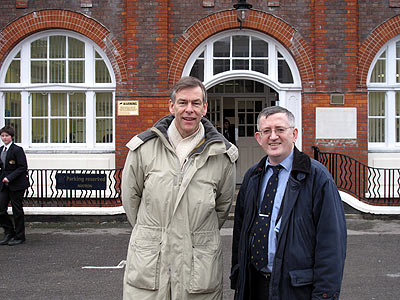
(Left) Dave Stevenson (RGS 1964-70) and (right) John Saunders (RGS 1963-70)
in front of the RGS clock tower entrance on 12 February 2009.
I'm very close to the spot where I was photographed 46 years previously (see above)...
... older, fatter, more cheerful, but still not very good at combing my hair.
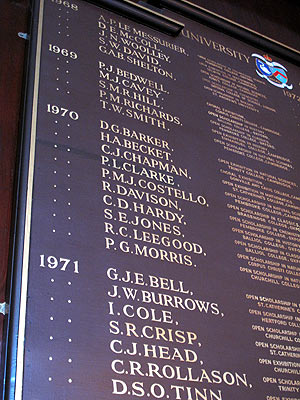
The school honours board, with some names from my generation including two from Form 2E...
... and, no, my name isn't one of them!
Some of the photos I took on my visit to the school on 12 February 2009 when Ian Clark kindly gave me and Dave Stevenson a guided tour. Many thanks to Ian for doing this. Any comments on the foregoing? Email